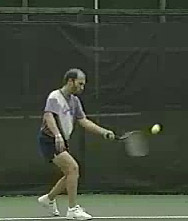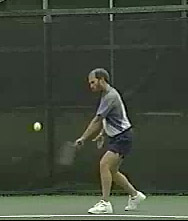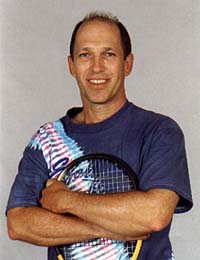Theories of the Game
![]()
|
<% ns_puts [mkm_getnavbar] %>
|
|
|||||||
|
The precompetitive phase is the time when we learn the game, it takes a minimum of 2 years—if we are practicing a lot. During learning, competition should be non-existent, because, as I said (see part 1), in a competitive situation people's focus shifts from learning, to doing whatever they need to do to win.
Phase two of the Effortless Program is the competitive phase, which is an optional part of the program. If someone feels a need to prove themselves to some outside person, or just to themselves, then they can compete until they have proven what they needed to prove. After that it is preferable to move into the Effortless phase where we are working to play to our potential without the limitations of competition.
Once we have attained a certain skill level, there is no need to compete. Competition limits peak performance. The goal in conventional tennis is to end the point as quickly as possible. In Effortless Tennis the goal is to sustain the point for as long as possible. Effortless Tennis demonstrates that you can excel and have fun, without having to compete.
It has been believed the best way to learn how to do well in competition is to engage in lots of competition, as soon as possible. Logically, however, it does not make any sense to place people in competition before they have the necessary skills to perform the activity. For most participants it is a recipe for failure. To paraphrase Alfie Kohn, some people advocate that failure may not be a bad thing because it keeps people from getting “a big head” and prepares people for the hard knocks of life. This is the proverbial school of hard knocks theory of learning. Put people in bad conditions and let them work it out for themselves—supposedly it is a good character builder. To me this is not the optimal approach to education.
Adversity teaches us a lot, but it doesn’t teach us to do our best. Again Kohn makes a great point in saying, "The idea that we are best prepared for unpleasant experiences by being exposed to unpleasant experiences at a tender age is about as sensible as the proposition that the best way to help someone survive exposure to carcinogenic substances is to expose him to as many carcinogens as possible in early life. Too much adversity undermines motivation and enjoyment. Life gives us enough adversity, we don’t have to add to it in our educational system.
|
I am not here to say that competitive based learning does not work. Many people have succeeded beyond all expectations, on certain levels, in the school of hard knocks. The accomplishments of competition are well documented. Personally I have witnessed and enjoyed many fantastic feats of achievement in competition. The conclusion of my research however is that competitive based learning does not work best. In a small percentage of people, competitive learning produces strong motivation and a striving for excellence, but for the vast majority of people, because of their lack of success, it diminishes these desires.
Most people do not thrive in an environment where they are subjected to anxiety, uncertainty, hyper-aggressive behavior, fear, and intimidation. We can achieve great performance in competition, but we can’t achieve our best performance in competition. How can we do our best when someone is trying to stop us from doing our best? It can’t happen.
We don’t need the school of hard knocks to make us excel, but we do need to accept that learning any high skill activity is a long-term process, which requires a lot of practice. We might wish that it didn’t work that way, but deep down we all know that it does. Anyone who tells us anything different is trying to sell us snake oil. No matter what sport or movement activity we are talking about, the physical skills alone take years to master.
In tennis, for example, we have to learn how to swing the racquet to hit all the different strokes (forehand and backhand groundstrokes, forehand and backhand volleys, first and second serves, forehand and backhand returns of serve, overheads, forehand and backhand lobs, and forehand and backhand approach shots), also, no matter where the ball might come, we have to learn how to move our feet to get into position to hit the shot.
 |
 |
Basic strokes like the forehand and backhand can take years to master and there are many other strokes to learn as well. |
|
We need to develop incredible hand/eye coordination and concentration in order to stay focused on the ball and contact it in the center of the racquet, at the ideal contact point, and at the ideal moment in time. In addition to all of the above, we need to learn how to stay relaxed under pressure. Accomplishing all this is no easy task, especially if we do not know what we are doing. It is going to take time.
One misconception that many people have is that they believe basic skills are only physical. The most important basic skills are mental and emotional, areas like concentration, relaxation, patience, perseverance, self-motivation, and confidence.
All sports and movement activities are at least 85% mental and emotional. Unless we have developed these skills in some other activity, it will take even more years for mastery to occur. These mental and emotional skills are not advanced skills, these skills are an integral part of the basics.
|
|
Learning works best in a nurturing, supportive, creative, loving
environment—
one that encourages the student and ignites his/her desire to learn. David
and Roger Johnson concluded from their research into learning that
"cooperative learning situations, compared with competitive and
individualistic situations, promote higher levels of self-esteem and
healthier processes for deriving conclusions about one's self worth."
Alfie
Kohn found that, "A number of psychologists have proposed that optimal
human
functioning presupposes a sense of security about the world--a confidence
that it is a safe place and one's needs will be met.”
Competition need not be a part of learning by doing. Opportunities to
practice and master basic skills in the nurturing environment of
collaborative learning with other learners, not rivals, brings out the
best
skills and attitudes in all participants. Only when everyone is helping us
can we reach our potential. To some people the ideas proposed here
will sound idealistic, but, for the long-term, isn’t that the goal that
all
of us should be working to create? If we can teach everyone in a
non-competitive environment, from the beginning of their learning process,
not only will they develop faster, be better, go further, and have more
fun,
they will also have a clear model for learning the next activity that they
want to learn. This is one of the biggest benefits of this program,
providing
a road map to the next activity. If we don’t know what we need to know,
how
can we learn it? Once we know how learning works, we can learn whatever we
desire to learn. Effortless Tennis provides a blueprint for learning.
 Brent
Zeller has been involved in sports for over 40 years. He’s been playing
tennis for 33 years and played tournament tennis for 18 years.
Brent
Zeller has been involved in sports for over 40 years. He’s been playing
tennis for 33 years and played tournament tennis for 18 years.
Brent began teaching in 1974 and joined the USPTA in 1975. He has been teaching in Marin since 1985. Brent has an extensive background in psychology, philosophy, and learning theory.
His evoluntionary non-competitive learning system is the only one of
its kind.
www.effortlesstennis.com
Last Updated 4/1/02. To contact us, please email to: webmaster@tennisone.com
TennisONE is a registered trademark of TennisONE and SportsWeb ONE; Copyright 1995. All rights reserved.